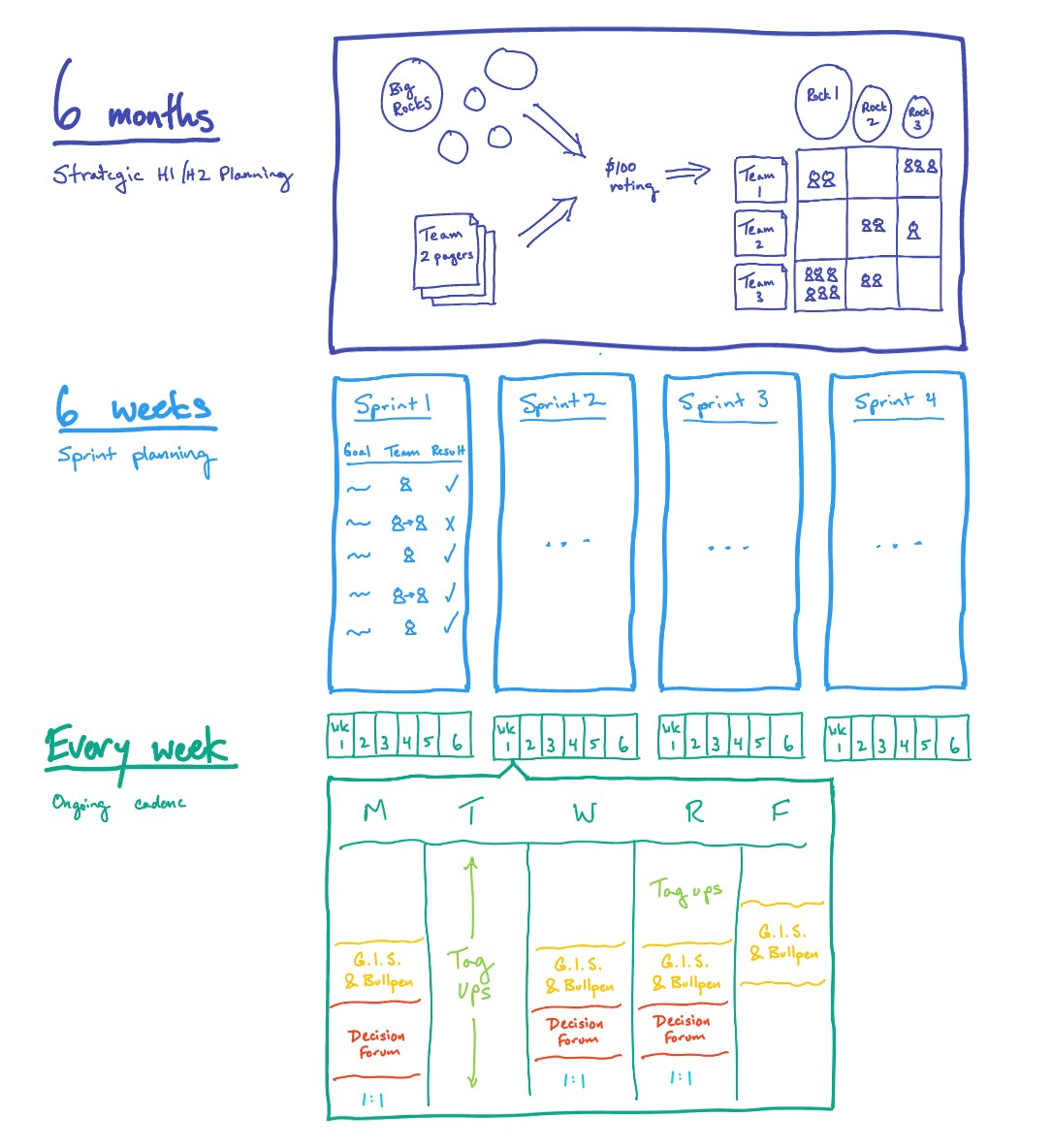This Week - #6 OKRs Part Deux - Operationalizing Clarity, Focus and Outcomes
Welcome to this week’s (aspirational goal) Product Hustle Stack newsletter. Each week, we try to address a product management topic about interviewing, growth, improving your team, how to create a roadmap, or just getting unstuck. Oh and we also provide an update on what’s new on the producthustlestack site .
CALL TO ACTION: Looking to get into product management and don’t know where to start? Simply reply to this email and let us know - We’ll keep it anonymous and we’ll do our best to answer it from our perspectives and experiences.
Let's get on with week 6 content
To receive this newsletter in your inbox weekly, please do subscribe 👇
Q:Now that I know how to define OKRs, how do I make sure they are implemented correctly?
So now that we have learn the proper way to define OKRs and what to look out for, a great follow up question is how do we actually operationalize it. How do we organize ourselves to make sure we have the right focus and muscle memory to pursue the OKRs. The short answer is making sure your organization, department and/or team has the right rituals. A great example of an organization that leveraged their rituals and OKRs to great success is Youtube. They organized their rituals around 3 key components.
Strategic planning, which occurred every 6 months. In these meetings, they would decide on which big rocks or aspirational goals to go after and which teams or resources to focus/map on those efforts. The important thing here to remember is no that this happened every 6 months (in most orgs it happens quarterly) but the outputs.
Sprint planning, which for Youtube occurred every 6 weeks. During this process, the teams made real commitments that other team could depend on. Youtube kept this to a light 2 days of focus vs 3 weeks for the strategic planning process mentioned above.
Lastly the weekly execution rituals, assured that teams had the right connective tissue and audience to attack their OKRs. Weekly meetings came in four flavors.
Decision making. A small set of leaders that would review writeup with options in advanced.
Large information sharing meeting that were use for broadcast and awareness
Project-specific group meetings called Tag-ups that had rollover agendas from the previous week
Individual one-on-ones
The visualization below does a great job of putting it all together.
Interested in the detailed explanation. Visit the page
Q: What is new on the Product Hustle Stack?
We’ve added a ton of new resources in the last few weeks.
First 1000 Newsletter by Ali Abouelatta, is a great growth oriented newsletter that interviews and sometimes research the early days of popular startups and how they got their first 1000 customers
The Three Questions Facebook Uses To Guide Their Product Development by Alex Pedicini, is a great and simple framework to make sure you are building a product that fits a need and is valued.
First 1000 - Stripe Deepdive by Ali Abouelatta, dives into the early days of Stripe and how they leverage growth to get their first 1000 customers.
Product Philosophy by DJ Patil, is simply a one-page notes that encapsulates how product managers should attack their work.
Growth Skills Assessment by Sean Ellis is an incredibly comprehensive test I recommend everyone to take that is remotely interested in becoming a Growth Product Manager or just wants to be knowledgeable about that sub-disicipline. I can underline how unique and chock-full of value the assessment test is. And it’s FREE
Product TradeOffs Podcast by Hiten Shah & Patrick Campbell is a really great podcast where Hiten and Patrick break down product decisions in popular app like Evernote and many more. It's rare to have this access and see how these veterans assess other products.
Youtube Weekly Meeting Cadence by Shishir Mehrotra, details the weekly calendar of a product manager at Youtube.
Youtube’s Golden Rituals by Shishir Mehrotra, details the rituals at Youtube prior to and after their acquisition by Google that help them achieve their incredible product development and user growth.
Fireside PM Podcast by Tom Leung is a podcast where product leaders are interviewed about pretty much everything from career progression, OKRs, execution, and delivering results in both large and small orgs. New videos release every 2 weeks.
Survival Metrics by Adam Thomas helps product teams that know that a project needs to change direction, but don’t have a way to make that change safely and quickly. Survival Metrics empower them to do just that.

